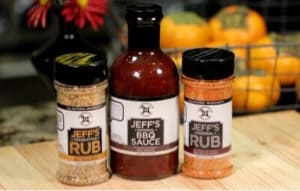Not to belabor the point,
(but I'm gonna, because I'd rather teach people how not to get burned than to do their skin grafting)
ABC will work for Class A (normally burning solids, like wood, paper, etc. B is for burning liquids that are not self oxidizing, and C is for general electrical fires (based on the conductivity and corrosivity of the extinguishing agent).
Most ABC extinguishers are charged with Mono ammonium phosphate (because it's not very conductive), but some are just charged with baking soda.
Either charge will work to suppress common fires, but MAP is easier on electronics and harder to clean up.
Common "Consumer" (non-recharge,<10#)ABC extinguishers are essentially "One and Done" in that, once you activate the trigger, a lot of stuff is coming out in a hurry, and you can't effectively control volume or velocity. so if you're in a situation wherein there's a bunch of flaming grease in a puddle, you stand a good chance of spraying it all over the place. Unfortunately, Halon, which is really good at not poisoning, (though still good at suffocating, in fire-suppressive concentrations), you or your passengers (on a Boat or Airplane) or trashing your sensitive computer equipment, is a long way from optimal. Halon delivery systems are designed to flood areas with high pressure/high volume streams of non-fire supporting gas, and are, therefore, nowhere near as "Modulatable" in terms of putting out a mundane liquid fire with a minimum of rigamarole as is CO2, and this is because CO2 extinguishers are made with "variable speed" valves. (think PUFF (wait) PUFF (wait) PUFF...
They have that great big cone on the front so that they don't freeze, and also so, in order that they don't blow burning liquid all over everything you are trying to save, you can keep the velocity of the gas flow low, but still very turbulent and high-volume. (they also produce exponentially more extinguishing gas volume for a given weight than do other extinguishers.
Give Halon's exponentially higher costs and reduced utility for a potentially "mundane" fire environment, I would strongly recommend a 10# CO2 system for a fire-prone situation such as you describe, and just to make sure, go set some stuff on fire in the back yard, and put it out (for the $15 recharge fee) and you'll be much better prepared than before.




